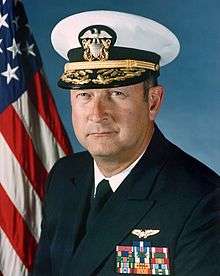Lyle F. Bull
| Lyle F. Bull | |
|---|---|
 | |
| Born |
April 8, 1938 Illinois, United States |
| Allegiance |
|
| Service/branch | United States Navy |
| Years of service | 1965–1998 |
| Rank | Rear admiral |
| Commands held |
Deputy Director of Naval Training Deputy Commander-in-Chief of the United States Pacific Fleet, |
Lyle Franklin Bull (born April 8, 1938) was a rear admiral in the United States Navy. He was a former Deputy Director of Naval Training, Deputy Chief of Naval Operations for Air Warfare,[1] deputy commander-in- chief of the United States Pacific Fleet,[2] and commanding officer of the USS Constellation, from 1982 to 1984. Bull is an alumnus of Iowa State University.[3] Bull previously served in the United States Navy Reserve for four years before rejoining in January 1965.[4]
His awards include the Navy Cross, Distinguished Flying Cross, Distinguished Service Medal, 19 Air Medals, several Navy Commendations, Unit Awards, Meritorious Service awards, and a medal from the Imperial Order of the Rising Sun from the Japanese Maritime Self Defense Force.
His Navy Cross citation reads:
The President of the United States of America takes pleasure in presenting the Navy Cross to Lieutenant Lyle Franklin Bull (NSN: 0-643704), United States Navy, for extraordinary heroism on 30 October 1967 as a Bombardier/Navigator in Attack Squadron ONE HUNDRED NINETY-SIX (VA-196), embarked in U.S.S. CONSTELLATION (CVA-64). Exercising exceptional professional skill and sound judgment, Lieutenant Bull assisted in the planning and execution of an extremely dangerous, single-plane, night, radar bombing attack on the strategically located and heavily defended Hanoi railroad ferry slip in North Vietnam. Although the entire Hanoi defensive effort was concentrated upon his lone bomber, he flawlessly assisted his pilot in navigating the aircraft to the target area and commencing an attack. Seconds before bomb release, six enemy surface-to-air missiles were observed to be tracking on his plane. Undaunted by this threat to his personal safety, Lieutenant Bull assisted his pilot in taking swift and effective action to avoid the missiles and complete the attack, releasing all weapons in the target area with extreme accuracy. After release, four more missiles were fired at his aircraft in addition to the intense anti-aircraft-artillery fire. In spite of this intense enemy opposition, Lieutenant Bull completed his mission and was directly responsible for dealing a significant blow to the North Vietnamese logistics efforts. His indomitable perseverance and conspicuous gallantry were in keeping with the highest traditions of the United States Naval Service.[5]
Bull later retired to Oak Harbor, Washington.